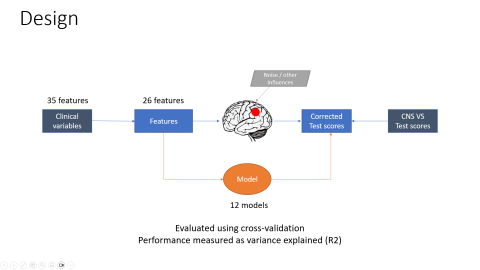Predicting the cognitive function of a patient with a brain tumor
Understanding patients’ cognitive functioning is important to help patients and their doctors to select the most suitable treatment. While we know that many variables collected during clinical care are linked to cognitive function, it is not clear if these factors could predict the cognitive function of individual patients. This is the case because sometimes, what's statistically significant for a group doesn't translate into accurate predictions for individuals.
Can we predict the cognitive functioning of a patient with a brain tumor, just by looking at their clinical data?
Cognitive impairments are common among patients with a primary brain tumor, and these impairments are frequently reported as a great burden by both patients and caregivers. Understanding patients’ cognitive functioning is important to help patients and their doctors to select the most suitable treatment. While we know that many variables collected during clinical care are linked to cognitive function, it is not clear if these factors could predict the cognitive function of individual patients. This is the case because sometimes, what's statistically significant for a group doesn't translate into accurate predictions for individuals.
In a recent study, authored by Sander Boelders, Karin Gehring, Eric Postma, Geert-Jan Rutten, and Sharon Ong, multiple popular machine-learning models were used to test if different aspects of a patient’s cognitive function could be predicted. This was done while using a comprehensive set of variables that were collected during clinical care, including patient demographics, medicine use, indicators of health, and variables describing the tumor. The findings? The usual factors that have been related to cognitive functioning in previous studies weren't as helpful as one might expect when it came to predicting cognitive function for individual patients. This means doctors should be careful about relying too much on these factors alone to infer cognitive functioning of individual patients.
What the authors learned is that it's important to look at each patient holistically, considering as much information that we know to be related to cognitive functioning as possible. Moreover, results indicated that larger datasets are necessary to learn how to accurately predict the cognitive functioning of individual patients, ideally including many factors that we know to be related to cognitive functioning.
The study hopes to clarify the difference between explaining and predicting cognitive functioning. Moreover, it sets out to encourage collaboration between medical centers to create larger and more diverse datasets. Ultimately the goal would be to pave the way for predicting cognitive functioning after surgery using information that is available before surgery. This would help doctors and patients to select the treatment that offers the best balance between survival and quality of life.
Interested in learning more about this study? The corresponding publication can be found here: https://doi.org/10.1093/neuonc/noad221

